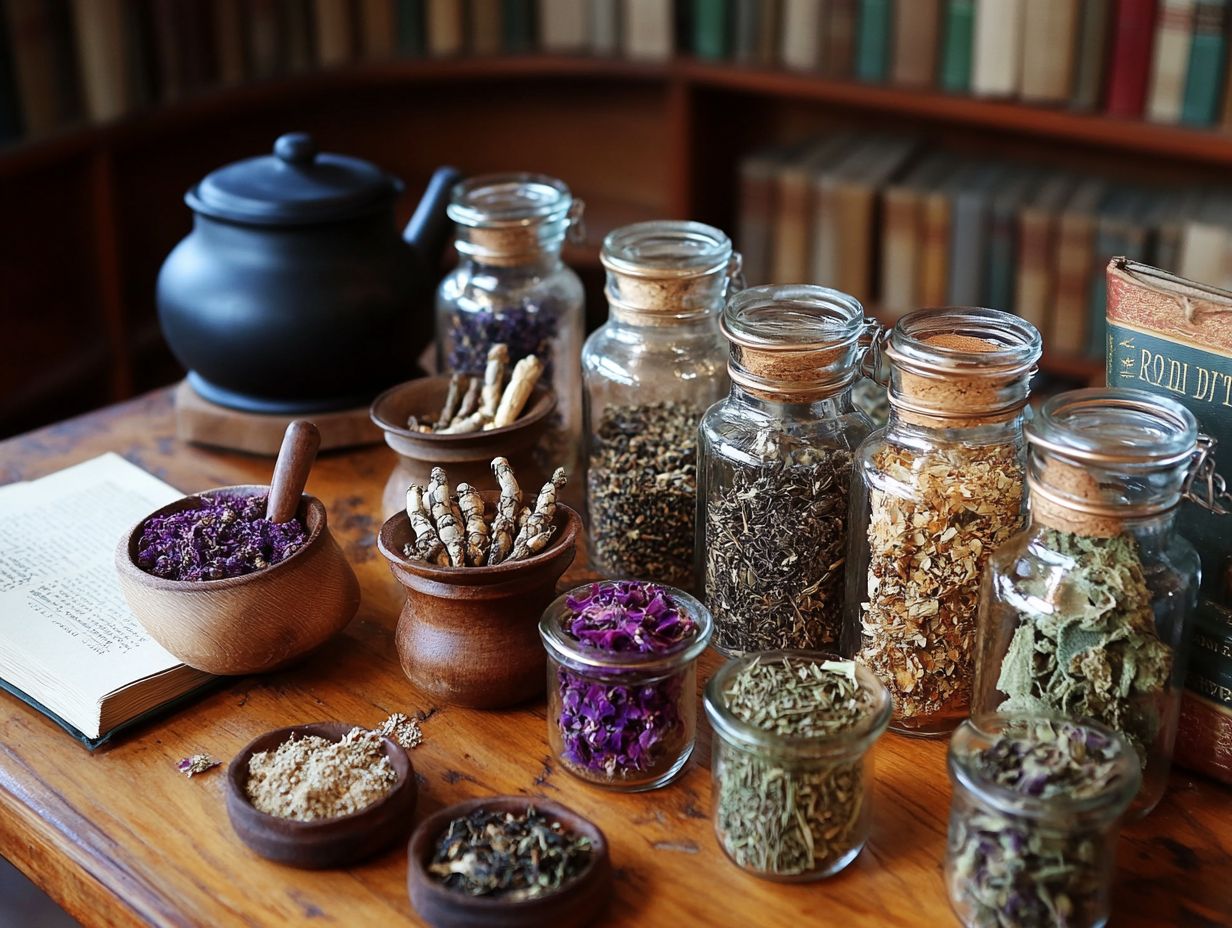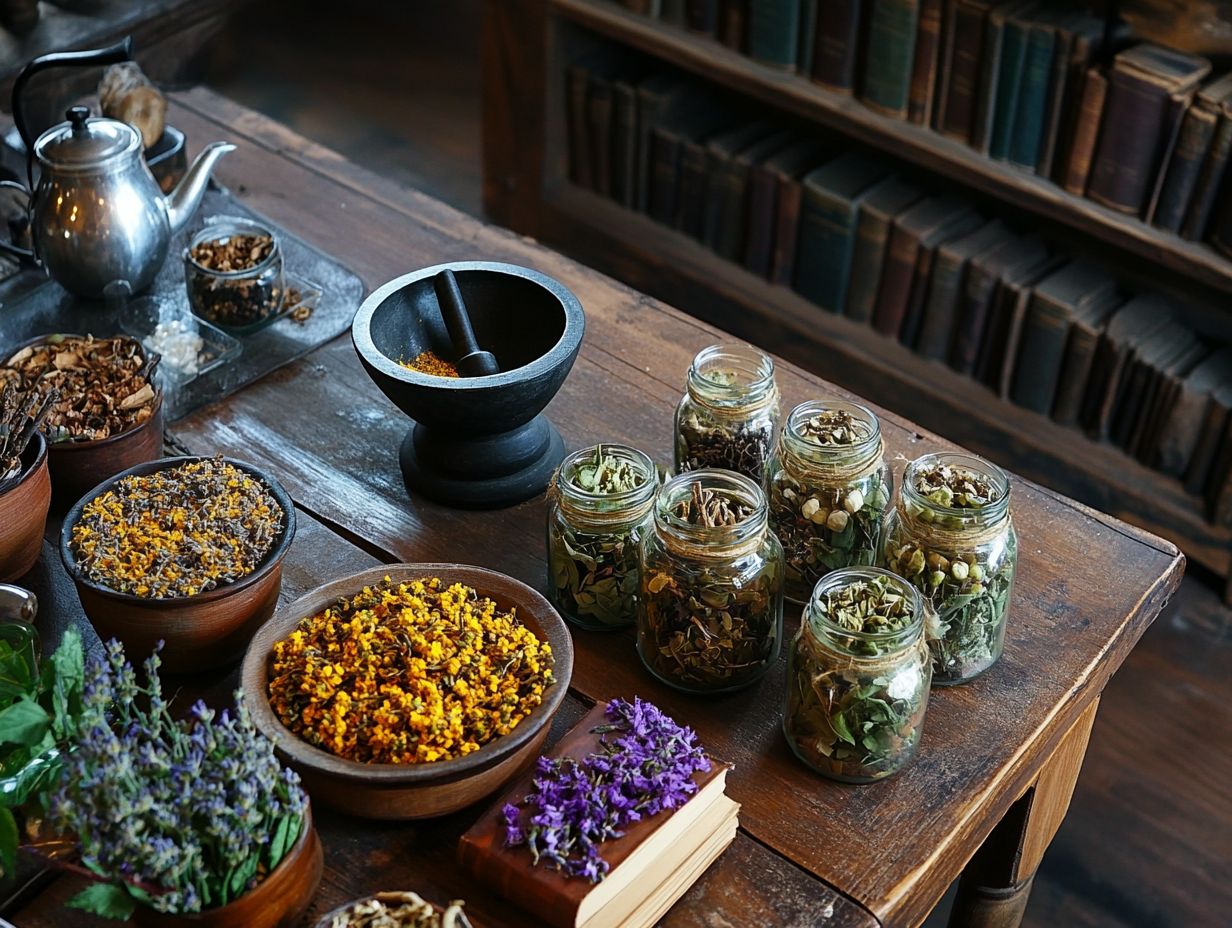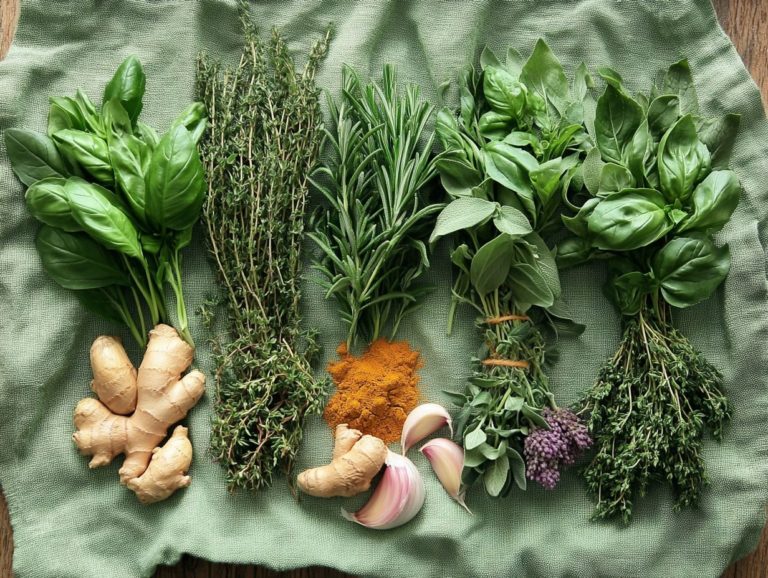The Role of Herbal Remedies in Traditional Medicine
Traditional medicine boasts a rich tapestry woven from diverse cultures and continents, grounded in principles that prioritize natural healing and remedies.
Herbal remedies, a fundamental pillar of this practice, have been used for centuries to address a wide array of ailments. They provide valuable insights into their effectiveness and limitations.
This exploration delves into the realm of traditional medicine, illuminating the various types of herbal remedies available, their benefits, and potential risks.
Discover how these old practices can complement modern treatment approaches and what they signify for the future of wellness.
Contents
- Key Takeaways:
- Understanding Traditional Medicine
- The Use of Herbal Remedies in Traditional Medicine
- Herbal Remedies for Common Ailments
- Safety and Regulation of Herbal Remedies
- Incorporating Herbal Remedies into Modern Healthcare
- Frequently Asked Questions
- What is the role of herbal remedies in traditional medicine?
- How do herbal remedies differ from modern medicine?
- What types of illnesses can be treated with herbal remedies?
- Are herbal remedies safe to use?
- What is the process for using herbal remedies in traditional medicine?
- Can herbal remedies be used in conjunction with modern medicine?
Key Takeaways:

- Herbal remedies have helped people for centuries.
- They offer benefits for common issues like pain and digestion.
- Collaborating with modern healthcare can make these remedies even safer and more effective.
Understanding Traditional Medicine
Understanding traditional medicine opens a world of possibilities in today s healthcare! For centuries, cultures around the world have woven traditional and complementary medicine (T&CM) practices into their health systems, creating a rich tapestry of knowledge.
The World Health Organization (WHO) recognizes the vital role traditional medicine plays in expanding health coverage, especially in developing regions. This insight deepens appreciation for diverse healing modalities like acupuncture and Ayurveda and underscores the necessity of incorporating these approaches into modern health systems.
By doing so, you can ensure patient safety and treatment efficacy within the broader scope of global health.
History and Principles of Traditional Medicine
Traditional medicine has thousands of years of history, enriched by various cultures, including renowned practices like Ayurveda and acupuncture.
These ancient healing systems emerged from meticulous observations of nature and the human body, forming the foundation of holistic health approaches. Over the years, practitioners have fine-tuned these methods, leading to groundbreaking discoveries such as herbal remedies, which are celebrated for their effectiveness across diverse cultures.
Notably, the World Health Organization highlights these traditional techniques for their potential in modern healthcare, advocating for integrative approaches that bridge traditional and contemporary medicine. This acknowledgment reflects a burgeoning appreciation for the wisdom embedded in age-old therapies and their crucial role in personalizing healthcare today.
The Use of Herbal Remedies in Traditional Medicine
Herbal remedies serve as a cornerstone of traditional medicine, offering insights into the science behind herbal remedies and providing a rich tapestry of healing practices across various cultures.
Many societies have relied on medicinal plants and natural products to effectively address both physical and mental illnesses, blending the wisdom of nature with the art of healing.
Types of Herbal Remedies
Herbal remedies can be categorized into various forms, such as tinctures, teas, and capsules, each originating from distinct medicinal plants. Each of these options offers unique benefits and preparation methods, catering to a spectrum of preferences and therapeutic needs.
Tinctures, often crafted as alcohol-based extracts, deliver concentrated doses of active compounds. Teas involve the soothing process of steeping herbs in boiling water, allowing for a gentle infusion of flavors and benefits.
Capsules present an effortless way to consume powdered herbal ingredients, bypassing any need for preparation.
Exploring ethno-pharmacology, the study of how different cultures use plants for medicine, reveals fascinating approaches to healing. This exploration not only deepens appreciation for herbal medicine but also enriches your modern perspective on holistic health.
Benefits and Limitations

Herbal remedies undoubtedly offer a wealth of benefits, including the potential to effectively treat a variety of ailments. Recognizing their limitations is just as important.
These natural alternatives often attract attention for their complete way of looking at health and generally lower side effect profiles. However, not all herbs undergo rigorous testing. Their effectiveness can vary widely, influenced by factors such as preparation methods, dosages, and individual responses.
The lack of comprehensive clinical trials means that potential interactions with conventional medications remain largely unexplored. Advocating for evidence-based practices is crucial to safeguard your health, ensuring that herbal options are safe and effective when combined with treatment plans.
Herbal Remedies for Common Ailments
Herbal remedies serve as a valuable option for addressing common ailments like headaches, digestive issues, and stress-related disorders. They demonstrate remarkable versatility.
Examples and Effectiveness
Consider the efficacy of popular herbal remedies like chamomile for sleep issues and ginger for digestive ailments, both of which have varying levels of support from clinical trials.
A study published in the journal Sleep Medicine revealed that participants who consumed chamomile extract enjoyed enhanced sleep quality and a noticeable reduction in insomnia symptoms compared to those who received a placebo.
Ginger has also attracted attention in research for its potential to alleviate nausea and support digestion. A clinical trial featured in The World Journal of Gastroenterology found that ginger significantly diminished nausea in patients post-surgery.
These findings underscore how certain herbal remedies can deliver real benefits, prompting many to consider natural alternatives for their health challenges.
Safety and Regulation of Herbal Remedies
The safety and regulation of herbal remedies are paramount concerns. You deserve quality products that ensure your well-being, free from harmful contaminants.
Thorough oversight in the herbal market provides peace of mind with every choice you make.
Potential Risks and Quality Control
When considering herbal remedies, it’s essential to be aware of potential risks such as contamination, mislabeling, and interactions with conventional medications. These concerns highlight the crucial need for stringent quality control.
Such issues not only undermine the effectiveness of herbal treatments but can pose serious health risks to those who consume contaminated or inaccurately labeled products. The lack of standardization in the herbal industry can also lead to variations in potency, complicating the risk of adverse reactions.
Stay informed: herbal remedies can offer benefits, but proceed with caution. Prioritizing products from reputable suppliers is key.
By adopting a responsible approach that emphasizes quality control, you can enhance your safety and work towards better health outcomes.
Incorporating Herbal Remedies into Modern Healthcare

Incorporating herbal remedies into modern healthcare opens up valuable opportunities for collaboration between conventional and traditional medicine practitioners.
By embracing this fusion, you can enhance patient care and broaden treatment options, leading to more holistic and effective healing practices.
Before trying herbal remedies, consult with health professionals for the best guidance tailored to your needs.
Collaboration with Traditional Healers
Collaborating with traditional healers can significantly enhance the acceptance and integration of herbal remedies in contemporary healthcare systems. Such partnerships have shown remarkable success in various regions, where healthcare providers combine indigenous healing practices with modern treatments.
For example, a case study from South Africa highlights how hospitals partnered with local traditional healers to educate patients about effective herbal therapies. This initiative led to increased patient satisfaction and improved health outcomes.
These efforts foster trust between practitioners and patients while respecting cultural beliefs. This paves the way for a more holistic approach to healthcare. By bridging the gap between conventional medicine and time-honored traditions, we can help modern healthcare evolve into a more inclusive and effective system.
Potential for Integration into Treatment Plans
The potential to combine herbal remedies into treatment plans is significant, especially when grounded in evidence-based practices. This method creates a complete picture of patient care, blending traditional methods with modern science.
Such integration requires careful consideration of each patient s unique needs and existing medical conditions, ensuring that herbal interventions do not conflict with prescribed medications.
Establishing patient safety protocols is crucial. These strategies should include thorough patient education about the use of herbal remedies and their potential side effects.
You can confidently lead your patients with evidence-based approaches that transform their wellness journey!
Frequently Asked Questions
What is the role of herbal remedies in traditional medicine?
The role of herbal remedies in traditional medicine is to provide natural, plant-based treatments for various health conditions. These remedies, including the role of herbal remedies in weight loss, have been used for centuries across different cultures and are key components of traditional medicine practices.
How do herbal remedies differ from modern medicine?

Herbal remedies are derived from plants and are considered natural treatments, while modern medicine often employs synthetic or chemical-based substances. Herbal remedies often aim to treat the root cause of an illness, whereas modern medicine may focus on specific symptoms.
What types of illnesses can be treated with herbal remedies?
Herbal remedies can treat a wide range of illnesses, including digestive issues, respiratory problems, skin conditions, and even mental health disorders. They are also commonly used for preventive purposes to promote overall health and wellness.
Are herbal remedies safe to use?
Herbal remedies have been used for centuries in traditional medicine with few reported side effects. However, consulting with a healthcare professional before using any herbal remedy is important, as some may interact with prescription medications or may not be suitable for certain individuals.
What is the process for using herbal remedies in traditional medicine?
In traditional medicine, herbal remedies are prepared in various ways, such as brewing teas, creating tinctures, or using specific plant parts. These remedies are taken orally or applied topically, depending on the specific treatment and condition being addressed.
Can herbal remedies be used in conjunction with modern medicine?
Yes, herbal remedies can complement modern medicine. Many healthcare professionals now incorporate herbal remedies into their treatment plans to provide a holistic approach to health and wellness. However, consulting with a healthcare professional before using herbal remedies alongside modern medicine is essential, as there may be potential interactions or contraindications.





